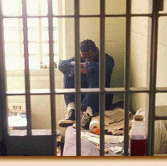 Nearly four decades of mass incarceration and over-criminalization have made the United States the world leader in incarceration and arrests. The number of Americans in federal and state prisons and jails has quintupled over the past four decades. As a result, nearly 2.3 million Americans are behind bars today. The U.S. incarceration rate is at more than six times the average across developed nations. “Communities of color” and “men of color” are hit hardest, with black men six times more likely and Latino men two-and-a-half times more likely to be incarcerated than white men.
Nearly four decades of mass incarceration and over-criminalization have made the United States the world leader in incarceration and arrests. The number of Americans in federal and state prisons and jails has quintupled over the past four decades. As a result, nearly 2.3 million Americans are behind bars today. The U.S. incarceration rate is at more than six times the average across developed nations. “Communities of color” and “men of color” are hit hardest, with black men six times more likely and Latino men two-and-a-half times more likely to be incarcerated than white men.
Between 70 million and 100 million Americans, or as many as one in three American adults have a criminal record. Many have been convicted of only minor offenses, such as misdemeanors and many have arrests that never led to a conviction. Regardless of whether an individual has been incarcerated, having a criminal record often carries a lifetime of consequences, lasting long after that person has paid his or her debt to society. A minor criminal record can be a life sentence to poverty, while presenting obstacles to employment, housing, education, training, public assistance, financial empowerment, and other lifestyle choices.
 While the effects of parental incarceration on children and families are well-documented, less appreciated are the family consequences that stem from the barriers associated with having a criminal record. A child’s life chances are strongly tied to his or her circumstances during childhood. Thus, these barriers may not only affect family stability and economic security in the short term but also may damage a child’s long-term well-being and outcomes.
While the effects of parental incarceration on children and families are well-documented, less appreciated are the family consequences that stem from the barriers associated with having a criminal record. A child’s life chances are strongly tied to his or her circumstances during childhood. Thus, these barriers may not only affect family stability and economic security in the short term but also may damage a child’s long-term well-being and outcomes.
Nearly half of U.S. children now have at least one parent with a criminal record. Parental criminal records create significant challenges among low-income parents and their families.
Income
Parents with criminal records have lower earning potential, as they often face major obstacles to securing employment and receiving public assistance.
Savings and assets
Mounting criminal justice debts and unaffordable child support arrears severely limit families’ ability to save for the future and can trap them in a cycle of debt.
Education
Parents with criminal records face barriers to education and training opportunities that would increase their chances of finding well-paying jobs and better equip them to support their families.
Housing
Barriers to public as well as private housing for parents with criminal records can lead to housing instability and make family reunification difficult if not impossible.
Family strength and stability.
Financial and emotional stressors associated with parental criminal records often pose challenges in maintaining healthy relationships and family stability.
Leave a comment